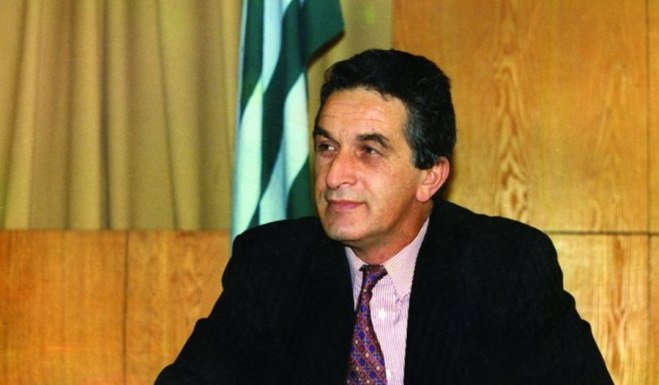Vladislav Ardzinba (1945-2010)

Vladislav Grigoryevich Ardzinba (Abkhaz: Владислав Арӡынба) (14 May 1945 – 4 March 2010) was a wartime leader and the first president of Abkhazia.
He was born in May 1945 in the village of Lower Eshera (just north of Abkhazia's capital, Sukhum), where his father taught history. He worked at Moscow's Oriental Institute under Yevgeny Primakov, who, as Russian Foreign Minister, was later to play a role in the post-war Georgian-Abkhazian negotiating process.
The thesis which earned Ardzinba his doctorate in 1986 was later published as "Rituals and Myths of Ancient Anatolia" (in Russian). The death in 1988 of Georgy Dzidzariya, director of the Abkhazian Research Institute, resulted in Ardzinba being invited to return to his homeland as Dzidzariya's successor, a post he retained until 1996.
As a leading local academic, Ardzinba was chosen in 1989 both as a deputy to Abkhazia's Supreme Soviet (becoming chairman in 1990) and as a people's deputy (as well as deputy to the USSR Supreme Soviet), which gave him national prominence. This was at a time when nationalism was rising in Georgia, in which, since 1931, Abkhazia had been an autonomous republic. A number of ethnic minorities in Georgia recognised the danger, and fatal clashes took place in July that year both in Abkhazia and southern Georgia's Azerbaijani-populated region. Ardzinba attracted attention and respect for the beautiful Russian in which he articulated the grievances and aspirations of the Abkhazians and other ethnic minorities across the USSR in the Palace of People's Deputies, established by Mikhail Gorbachev during perestrojka. The speeches in the Palace were broadcast live, drawing huge audiences fascinated by this experiment in openness (glasnost). Ardzinba quickly became the main individual focus for Georgian abuse as the figurehead of the Abkhazians' determination not to support Georgia's push for independence through fear of what that independence would mean for the very physical survival of their nation, reduced to a 17.8 per cent minority in their historical homeland by 1989. His appearance in London at the 1990 Caucasian Colloquium cased some discomfort amongst the Georgian delegation.
Vladislav Ardzinba's speech | The 1st Congress of People's Deputies of the USSR | 1989 (See English Transcription)
The draft of a parallel treaty to link post-Soviet Abkhazia and Georgia was tabled for discussion by the Abkhazian parliament on 14 August 1992. But hopes for peaceful coexistence with Georgia under Eduard Shevardnadze, who had returned to head the state council in March, were dashed when that very morning Georgia's National Guard crossed the River Ingur, sparking the bloody war that ended in Georgia's defeat on 30 September 1993. Magnanimously, Ardzinba responded to Yeltsin's plea to allow Shevardnadze safe-passage out of Abkhazia.
Despite many setbacks, Ardzinba proved to be an inspirational leader during those months from Gudauta in northern Abkhazia, the war-time home of the legitimate authority. The war left the country de facto independent from Georgia, but with a devastated infrastructure and economy; 4 per cent of the small Abkhazian population perished. Ardzinba promulgated a new constitution on 26 November 1994 and became the republic's first president. Boris Yeltsin's government had already demonstrated a pro-Georgian bias, and Ardzinba's refusal to sign Yeltsin's order to attack Chechnya at the end of the year will not have helped Abkhazia's cause. For the rest of the 1990s Ardzinba had to steer a careful course, avoiding renewed hostilities, rejecting concessions that would alienate fellow-Abkhazians, and not offending the Kremlin.
In 1997 Primakov arranged for Ardzinba to visit Tbilisi for talks with Shevardnadze, though there was no break-through. Ardzinba was elected (unopposed) to a second presidential term on 3 October 1999 and, exasperated by Tbilisi's constant stonewalling in the negotiations, declared Abkhazia independent on 12 October.
On October 3rd, 1999, where Ardzinba was re-elected as the president of Abkhazia. Under his leadership, Abkhazia tried to strengthen the economy, create links with the international community and promote the rightful self-determination of the people of Abkhazia. In 2003 his health seriously deteriorated and as a consequence was forced to resign the presidency of Abkhazia in 2004.
It was not long before the first signs of his illness (some slurring of speech and difficulty coordinating movement) began to appear. Treatment over the years in Moscow and Israel failed to reverse the deterioration, and Ardzinba was seen less often, eventually disappearing from view and becoming wheelchair-bound. Though he saw out his term, his deputy Raoul Khadzhimba eventually fulfilled presidential duties. The fact that the head of the presidential bodyguard fell ill at the same time as Ardzinba and soon died gave rise to intense speculation as to what might have been the cause.
Until illness struck, Ardzinba was a man of boundless energy. However, he was not exactly tolerant of contrary opinions, and this led to problems: at home he did not encourage the formation of an opposition and had differences of opinion with Parliament, whilst some visiting Western politicians and diplomats did not always take kindly to being lectured, when they came to listen and be heard. There were also questions about the control of the country's economic levers. Nevertheless, Ardzinba's place in Abkhazia's history as war-leader and deliverer of its independence cannot be erased. He lived to welcome Russia's recognition of Abkhazia on 26 August 2008 with the words: "The dreadful times are past; the difficult times now begin."
Vladislav Ardzinba dedicated his life to the struggle of Abkhazia for self-determination and freedom and passed away on Thursday, 4th March 2010 after a longstanding battle with cancer in Moscow’s Central Clinical Hospital.